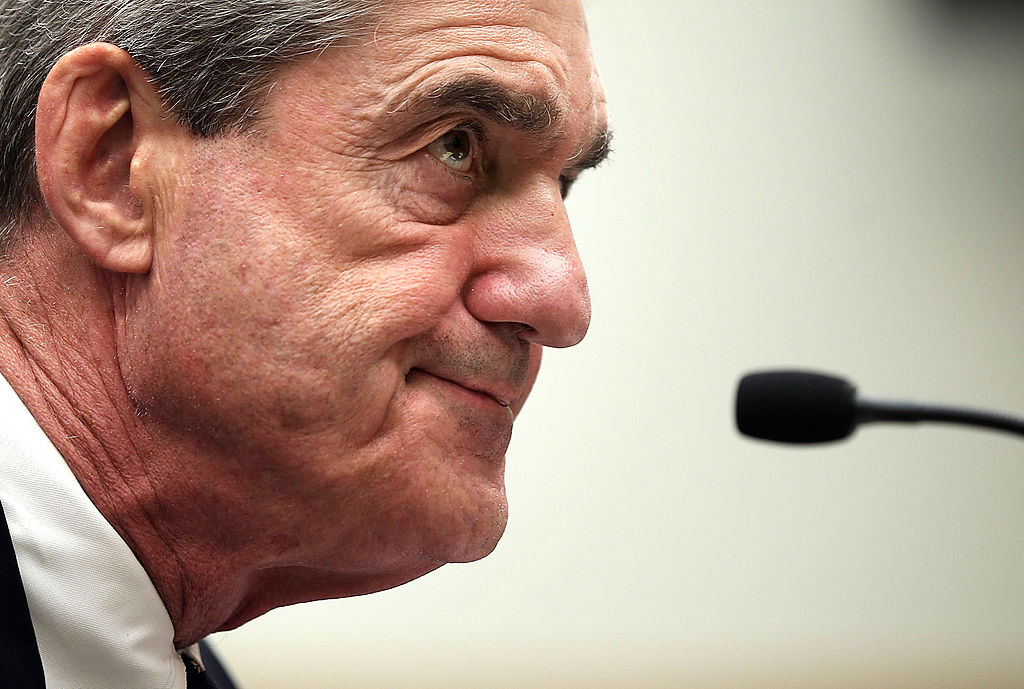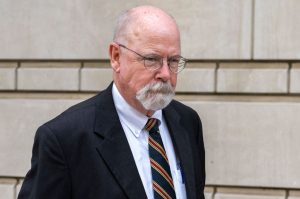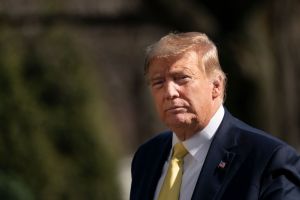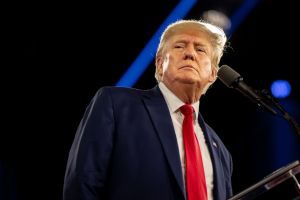For two years, Robert Mueller was the closest thing to a living saint Donald Trump’s political opponents could imagine. The FBI veteran was recast as St Michael, descending into the maw of Hell to strike down the Cinnamon Satan himself.
A dedicated page on Reddit, titled only ‘The Mueller’, amassed more than 170,000 subscribers. The women of SNL serenaded Mueller during the holidays. Avid fans bought Robert Mueller buttons, action figures, ugly Christmas sweaters, and mugs (‘After a long day of treason, It’s Mueller Time!’). The most pious lit Mueller-themed prayer candles.
By the final days of the investigation, the Associated Press even profiled elderly, dying Trump haters whose deepest wish was to live just long enough to see Mueller’s fateful report. Sadly, the AP never followed up. Cockburn would like to know how many made it that far — only to die of sheer disappointment.
St Mueller the Archangel did not cast the President into Hell, to put it mildly.
And so now, a year later, he is suffering the fate of so many others who are no longer useful to the American left. Rather than merely be forgotten, he has joined the cast of villains.
Playing the role of Brutus in this tragedy is Andrew Weissmann, once Mueller’s senior deputy, now the first member of his team to cash in with a book deal. Weissmann once put 85,000 people out of work by destroying the accounting giant Arthur Andersen with a bogus criminal probe that was later overturned unanimously by the Supreme Court. He is, you might say, an aggressive prosecutor. In Where Law Ends, he sticks pins into his old boss, blaming his timidity for the failure of the investigation to achieve more spectacular results. According to Weissman, Mueller ‘let the American people down’ by not issuing enough subpoenas, not probing Trump’s financial records and not openly accusing the President of obstruction of justice.
Weissman’s criticisms have unleashed a torrent of abuse against the #Resistance’s erstwhile champion. The same Twitter hoi polloi who may once have attended Muller testimony viewing parties now dubbed Mueller a ‘coward’, a ‘failure’ and even a ‘traitor’. Bluechecks were more measured in their language, but kept the clear venom.
I remember all the people yelling at me that I was wrong to state the obvious – that Mueller failed us.
I hope you all read this book. https://t.co/rrLTAGrIsm
— Neera Tanden (@neeratanden) September 21, 2020
Packer asked Weissmann “if Mueller had let the American people down.” Answer: “Absolutely, yep.”
Turns out Trump’s constant threat to fire Mueller and his dangling pardons worked. https://t.co/gpDXKbW5oI
— Max Bergmann (@maxbergmann) September 21, 2020
This last point is incredible: Trump declared his finances off-limits to Mueller. That would have signaled to any half-alert investigator, "I guess the finances are where the crimes are stashed."
Instead Mueller … backed down and yielded. https://t.co/6edpbyNiy8
— David Frum (@davidfrum) September 21, 2020
But it is not Mueller’s conduct in 2018 that discredits the Mueller investigation, but Weissman’s conduct right now and the press’s coverage of it.
***
Get a digital subscription to The Spectator.
Try a month free, then just $3.99 a month
***
The Atlantic’s original headline on Monday says it all: ‘The Inside Story of Why Mueller Failed.’ It has been many years since Cockburn studied rhetoric, but he believes this is what Aristotle called ‘assuming the conclusion’. A special investigation looking for a vast conspiracy to collude with a foreign power to rig an election is not a ‘failure’ if it does not find that conspiracy. It is a success, so long as it manages to find the truth.
But the truth was not what the President’s enemies wanted. That is why Weissmann told the Atlantic that the report was a ‘historic missed opportunity’. The opportunity in question wasn’t learning the truth about Trump. It was the chance to nullify the 2016 election. But Mueller’s conclusions were unambiguous: he found no evidence the President colluded with Russia and no evidence he tried to. Without collusion, the ‘obstruction’ charges Weissman wanted become a farce; Trump would have been accused of obstruction for angrily calling a baseless, politically-motivated investigation baseless and politically motivated.
Nevertheless, Weissman’s book makes it clear that exact situation is nearly what happened. And that, perhaps, is the real disturbing revelation from Weissmann’s book. A groundless investigation, driven by a political temper tantrum, didn’t just sidetrack US politics for two years. It nearly succeeded in bringing down a presidency. And while Weissmann may have ‘accidentally’ erased his phone twice during the course of the investigation, he doubtless has notes to ensure the next political inquisition does not fail.


















